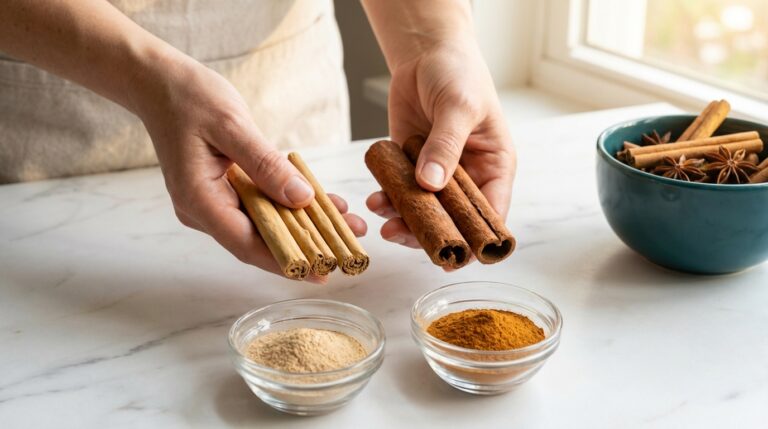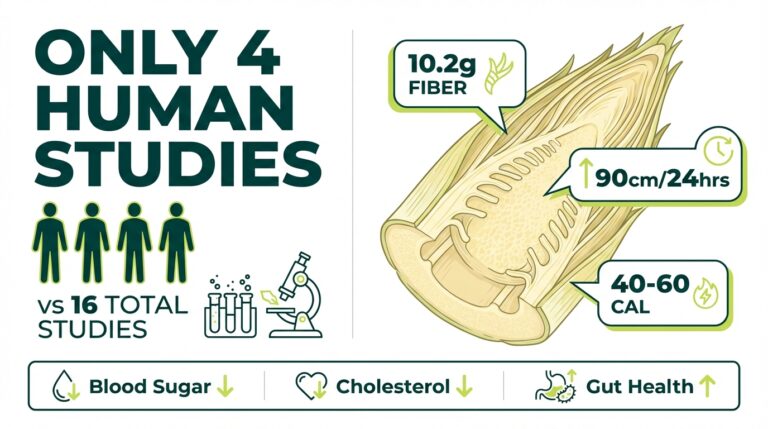6 Science-Backed Reasons Why a Pinch of Cinnamon Before Bed Could Transform Your Health

Looking for a simple nighttime ritual that could improve your health? Taking cinnamon before bed might be the effortless habit you’ve been searching for. That warm, sweet aroma wafting from your spice cabinet isn’t just pleasant—it’s hiding some serious health benefits backed by modern science.
While cinnamon has flavored our foods and folk remedies for centuries, researchers are now validating what traditional healers always knew. More people are discovering this simple practice: stirring a small pinch of cinnamon into warm water before bed. It’s not a magic bullet, and it won’t replace your doctor’s advice, but research suggests this ancient spice ritual might support your body in ways you never imagined.
Let’s explore six evidence-based reasons why this humble spice deserves a spot in your evening routine.
1. Taking Cinnamon Before Bed Helps Keep Your Blood Sugar Steady While You Sleep
If you’ve ever woken up feeling shaky or noticed your energy crashes throughout the day, unstable blood sugar might be the culprit. Here’s where cinnamon before bed gets interesting.
What the Research Shows
Multiple clinical trials and comprehensive reviews published by the National Institutes of Health have found that regular cinnamon consumption can help lower fasting blood sugar levels. This effect is particularly pronounced in people dealing with prediabetes or type 2 diabetes. One analysis of several studies showed that taking cinnamon consistently—not just once or twice—led to measurable improvements in how the body processes glucose.
How It Actually Works
Cinnamon contains compounds that appear to make your cells more responsive to insulin, the hormone that helps sugar move from your bloodstream into your cells for energy. According to research from the American Diabetes Association, cinnamon can improve insulin sensitivity significantly.
However, let’s be crystal clear: a pinch of cinnamon before bed isn’t going to replace diabetes medication or proper medical care. Rather, it’s a supportive addition to a healthy lifestyle, not a substitute for medical treatment.
The Nighttime Advantage
Taking cinnamon before bed may help support more stable blood sugar levels throughout the night and into the next morning. Your body is busy doing repair work while you sleep, and keeping blood sugar balanced during those hours can affect how you feel when you wake up.
Show Image Preparing cinnamon water is a simple 2-minute ritual that could transform your health
2. Cinnamon Before Bed Slows Down Digestion to Prevent Sugar Spikes
Ever feel that energy crash an hour or two after eating? That’s often a blood sugar spike followed by a rapid drop. Taking cinnamon before bed might help smooth out that rollercoaster.
The Gastric Emptying Effect
Research published in the European Journal of Clinical Nutrition has demonstrated that cinnamon can actually slow down how quickly food leaves your stomach—a process scientists call gastric emptying. When you eat carbohydrate-rich foods, they normally break down and enter your bloodstream fairly quickly, causing that familiar sugar rush.
By slowing this process, cinnamon helps create a more gradual, sustained release of glucose into your blood. This means fewer dramatic spikes and crashes, and more consistent energy levels throughout the day.
Beyond Just Blood Sugar
This slower digestion also means you might feel fuller for longer after meals. While taking cinnamon before bed won’t change what you’ve already eaten, understanding this mechanism helps explain why many health practitioners recommend it as part of an overall strategy for better glucose control.
The effect is subtle but meaningful—especially when combined with balanced meals and regular eating patterns.
3. Cinnamon Before Bed Delivers Powerful Antioxidants That Fight Inflammation
Inflammation gets blamed for a lot these days, and for good reason. Chronic, low-grade inflammation is linked to everything from heart disease to premature aging. Fortunately, taking cinnamon before bed delivers protective compounds that can help.
The Antioxidant Powerhouse
Cinnamon ranks among the most antioxidant-rich spices on the planet. According to a study in the Journal of Agricultural and Food Chemistry, cinnamon outranks many other spices in antioxidant capacity. It’s packed with polyphenols—plant compounds that act like tiny firefighters in your body, putting out the flames of oxidative stress and inflammation.
Show Image Cinnamon contains powerful polyphenols that fight inflammation throughout your body
The main active compounds include cinnamaldehyde (which gives cinnamon its distinctive flavor and smell) and cinnamic acid. These substances have been studied extensively in laboratory settings and human trials, consistently showing anti-inflammatory and antioxidant effects.
What This Means for Your Health
Think of antioxidants as your body’s defense system against cellular damage. Every day, your cells face attacks from free radicals—unstable molecules that can damage DNA, proteins, and cell membranes. Over time, this damage accumulates and contributes to aging and disease.
By regularly consuming antioxidant-rich foods and spices like cinnamon before bed, you’re giving your body extra ammunition to fight back. Explore our guide on anti-inflammatory foods to learn about other powerful additions to your diet.
While a single pinch won’t work miracles overnight, consistent intake over weeks and months can help reduce that underlying inflammation that contributes to so many health problems.
Why Bedtime Matters
Taking cinnamon before bed means your body can work with these beneficial compounds during sleep—when much of your body’s repair and regeneration happens. It’s like giving your internal maintenance crew better tools to work with.
4. Cinnamon Before Bed Supports a Healthier Balance of Bacteria in Your Gut and Mouth
Your body is home to trillions of microorganisms, and keeping them in balance is crucial for everything from digestion to immune function. Taking cinnamon before bed has natural properties that can help maintain this delicate ecosystem.
Natural Antimicrobial Properties
Laboratory studies published in the International Journal of Food Microbiology have consistently shown that cinnamon essential oils and extracts can inhibit the growth of various harmful bacteria and fungi. In fact, the food industry uses cinnamon as a natural preservative precisely because of these antimicrobial effects.
This doesn’t mean cinnamon is an antibiotic or that it will cure infections—it’s far gentler than that. Instead, think of it as creating an environment that’s slightly less hospitable to problematic microbes while generally leaving beneficial bacteria alone.
Oral Health Benefits
Your mouth is the gateway to your digestive system, and it hosts its own complex community of bacteria. Some of these bacteria cause bad breath, tooth decay, and gum disease. Swishing warm cinnamon water around your mouth before swallowing might help keep these troublemakers in check.
Traditional medicine systems have used cinnamon for oral hygiene for centuries, and modern research is beginning to validate this practice. While it’s not a replacement for brushing and flossing, it’s a pleasant addition to your oral care routine.
Gut Health Connection
The same antimicrobial properties that benefit your mouth may also support gut health when you take cinnamon before bed. Your digestive tract contains a vast ecosystem of microorganisms—your gut microbiome—that influences digestion, immune function, mood, and more.
By gently supporting microbial balance without disrupting beneficial bacteria, cinnamon may contribute to better overall gut health. This is particularly relevant at night, when your digestive system has time to rest and reset.
Show Image Cinnamon supports a balanced gut microbiome, essential for overall health
5. Cinnamon Before Bed May Support Metabolism and Healthy Weight Over Time
If you’re working on managing your weight or improving your metabolic health, taking cinnamon before bed might be a helpful addition to your toolkit. The keyword here is “addition”—it’s not a shortcut, but it could provide modest support.
The Metabolism Connection
Animal studies and laboratory research have found that cinnamaldehyde and other cinnamon compounds can affect fat cells, potentially influencing how your body stores and burns fat. Research in Metabolism: Clinical and Experimental suggests effects on thermogenesis—the process by which your body generates heat and burns calories.
Human studies have produced mixed but somewhat promising results. Several clinical trials have reported small improvements in markers like cholesterol levels, triglycerides, and other factors related to metabolic health in people who took cinnamon regularly over several weeks or months.
Setting Realistic Expectations
Let’s be honest: you won’t lose significant weight just by adding cinnamon before bed to your routine. Weight management is complex and involves diet, exercise, sleep, stress, hormones, and genetics.
However, if cinnamon can provide even modest metabolic support—perhaps helping your body process fats slightly more efficiently or supporting better blood sugar control—those small benefits can add up over time when combined with other healthy habits.
The Long Game
Think of cinnamon before bed as one small piece of a larger puzzle. Taken consistently as part of an overall healthy lifestyle, it might contribute to gradual improvements in metabolic health. This is a marathon, not a sprint.
6. Taking Cinnamon Before Bed Might Promote Better Sleep and Evening Relaxation
This benefit comes with the biggest asterisk, as the evidence is still emerging and largely anecdotal. However, enough people report feeling calmer after their evening cinnamon before bed ritual that it’s worth exploring.
The Preliminary Science
Some small animal studies published in Pharmacology Biochemistry and Behavior suggest that cinnamon extracts might influence neurotransmitter pathways, particularly those involving serotonin and melatonin—two chemicals intimately connected with mood and sleep regulation.
The idea is that by potentially supporting these pathways, cinnamon before bed might promote a sense of calm and prepare the body for rest. However, it’s crucial to emphasize that human studies are limited, and much of this evidence is preliminary or theoretical.
Show Image Creating a calming bedtime ritual with cinnamon can signal your body it’s time to rest
The Ritual Factor
Even if cinnamon’s direct effects on sleep are minimal, the ritual itself might be beneficial. Taking a few quiet moments before bed to prepare and sip warm cinnamon water creates a transition between your busy day and bedtime. This mindful pause can signal to your body and mind that it’s time to wind down.
Warm liquids in general tend to be soothing and relaxing. The act of slowing down, the pleasant aroma, and the warmth of the drink all contribute to a sense of comfort that can support better sleep—regardless of cinnamon’s specific chemical effects.
Managing Expectations
Don’t throw away your proven sleep strategies in favor of cinnamon before bed. If you struggle with serious sleep issues, you need proper evaluation and treatment from a healthcare provider. But as one element of a comprehensive sleep hygiene routine—along with consistent bedtime, limiting screens, and creating a comfortable sleep environment—cinnamon might be a pleasant addition.
How to Add Cinnamon Before Bed to Your Evening Routine
Ready to try this simple habit? Here’s how to do it effectively and safely.
The Basic Recipe
Start with about one-quarter to one-half teaspoon of cinnamon powder—that’s roughly a “pinch” to a “generous pinch.” Mix it into a cup of warm (not boiling) water. Stir well, as cinnamon doesn’t fully dissolve.
You can drink it as is, or add a squeeze of lemon or a small amount of honey if you prefer. Some people like to add it to warm milk instead of water, which creates a soothing bedtime beverage similar to golden milk.
Timing Matters
Try taking your cinnamon before bed drink about 30 minutes to an hour before sleep. This gives your body time to begin processing the beneficial compounds without sitting too heavily in your stomach when you lie down.
Consistency Is Key
Remember, the research showing benefits involved regular, consistent intake over weeks and months—not occasional use. If you want to see whether cinnamon before bed makes a difference for you, commit to the habit for at least a month.
Quality Counts
Not all cinnamon is created equal. Ceylon cinnamon (sometimes called “true cinnamon”) contains much lower levels of coumarin—a compound that can be harmful to your liver in large amounts—compared to the more common Cassia cinnamon.
If you plan to use cinnamon before bed regularly, investing in Ceylon cinnamon is worth the slightly higher cost. Look for it at health food stores or specialty spice shops.
Show Image Choose Ceylon cinnamon for regular use—it’s safer for long-term consumption
Important Safety Considerations
While cinnamon is generally safe for most people in culinary amounts, there are some important cautions to keep in mind when taking cinnamon before bed regularly.
Who Should Be Careful
If you have diabetes and take medication to lower blood sugar, talk to your doctor before adding regular cinnamon before bed to your routine. Since cinnamon can affect blood glucose levels, combining it with diabetes medication could potentially cause blood sugar to drop too low.
People with liver disease should also consult their healthcare provider, particularly if using Cassia cinnamon regularly, due to its coumarin content.
If you’re pregnant or breastfeeding, stick to small, culinary amounts of cinnamon and check with your healthcare provider before using it medicinally.
Possible Interactions
Cinnamon might interact with certain medications, including blood thinners and some antibiotics. If you take prescription medications regularly, have a conversation with your doctor or pharmacist about whether regular cinnamon before bed consumption is appropriate for you.
More Isn’t Better
There’s a temptation to think that if a little is good, more must be better. Not so with cinnamon. Excessive amounts can cause mouth irritation, allergic reactions, or—particularly with Cassia cinnamon—liver problems due to coumarin content.
Stick to reasonable amounts: a quarter to half teaspoon per day is plenty for most people seeking health benefits.
The Bottom Line: A Simple Addition Worth Trying
Adding cinnamon before bed to warm water isn’t going to revolutionize your health overnight. It’s not a cure for disease, a magic weight-loss solution, or a replacement for medication or proper medical care.
What it might be, however, is a simple, pleasant ritual that provides modest support for blood sugar balance, inflammation reduction, gut health, and overall wellness. The research is promising, the risks are minimal for most people, and the practice has stood the test of time across multiple traditional medicine systems.
Think of this evening cinnamon before bed habit as one small thread in the larger tapestry of a healthy lifestyle. Combined with nutritious eating, regular movement, adequate sleep, stress management, and proper medical care when needed, it might contribute to feeling a bit better over time.
The warmth of the cup in your hands, the comforting aroma, the quiet moment of self-care before sleep—these things have value in themselves, beyond whatever chemical benefits the cinnamon provides.
So why not give it a try? Choose quality Ceylon cinnamon, start with a small amount, and commit to the practice for at least a month. Pay attention to how you feel. You might just find that this centuries-old wisdom has something to offer your modern life.






